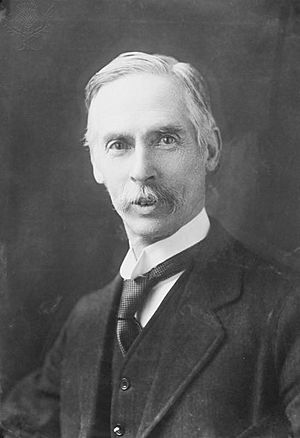J. A. Hobson facts for kids
Quick facts for kids
John A. Hobson
|
|
|---|---|

J. A. Hobson, circa 1910
|
|
| Born |
John Atkinson Hobson
6 July 1858 Derby, England
|
| Died | 1 April 1940 (aged 81) Hampstead, London, England
|
| Nationality | British |
| Field | Imperialism, poverty, unemployment |
| Alma mater | Lincoln College, Oxford |
| Contributions | Theory of underconsumption |
John Atkinson Hobson (born July 6, 1858 – died April 1, 1940) was an English economist and social scientist. He is best known for his writings on imperialism, which is when a country extends its power and influence. His ideas also influenced Vladimir Lenin and his theory of "underconsumption."
Hobson's main idea in economics was the theory of underconsumption. This theory criticized the old idea that saving money was always good. He believed that too much saving could lead to problems like unemployment. Because of his new ideas, he was not accepted by many other economists at the time.
Later, he wrote about how unequal income distribution could cause unemployment. He suggested that governments should use taxes to share wealth more fairly. He also strongly opposed the First World War. He wanted a world organization to prevent future wars. After the war, he became a socialist who believed in making changes through reforms.
Contents
Life Story of John A. Hobson
His Early Life and Education
John Hobson was born in Derby, England. His father, William Hobson, owned a successful newspaper. John was also the brother of the famous mathematician, Ernest William Hobson.
He went to Derby School and then to Lincoln College, Oxford. After finishing college, he worked as a teacher. He taught classic subjects and English literature in schools in Faversham and Exeter.
His Early Career and Economic Ideas
In 1887, Hobson moved to London. At that time, England was going through a big economic downturn. Many traditional economic ideas could not explain why the economy kept having ups and downs. London was full of groups suggesting new ways to think about the economy.
Hobson met people from different social and economic groups. He became friends with some of the Fabians, who later started the London School of Economics. However, his most important economic idea came from working with his friend, Albert F. Mummery.
Together, they wrote a book called Physiology of Industry in 1889. In this book, they introduced the "theory of underconsumption." This idea strongly disagreed with the belief that saving money was always good for the economy. They argued that if people saved too much and didn't spend enough, it could lead to economic problems. This new idea made many professional economists dislike Hobson, and he was eventually excluded from academic circles.
In the late 1800s, Hobson wrote several other books. These included Problems of Poverty (1891) and Evolution of Modern Capitalism (1894). In these works, he continued to question traditional economic theories.
Views on War and Imperialism
Hobson became a reporter for The Manchester Guardian newspaper. He went to South Africa to cover the Second Boer War. While there, he started to believe that imperialism was linked to modern capitalism. He thought that powerful mine owners, like Cecil Rhodes, wanted to control the Transvaal. He believed they pushed Britain into the war to make more money from mining.
When he returned to England, Hobson strongly spoke out against the war. He wrote books like War in South Africa (1900) and Psychology of Jingoism (1901). His most famous book, Imperialism (1902), explained his view that countries expand their empires to find new markets and places to invest money overseas. This book made him famous around the world and influenced thinkers like Vladimir Lenin.
Later, in his book The Industrial System (1909), he argued that when income is not shared fairly, it leads to too much saving and not enough spending. This causes unemployment. He suggested that the solution was to get rid of this "surplus" by taxing wealth and making monopolies (companies that control an entire market) publicly owned.
First World War and Later Years
John Hobson was against the First World War. He joined a group called the Union of Democratic Control. He believed a global political body should be created to stop wars. He wrote about this idea in Towards International Government (1914). However, he later became strongly against the League of Nations.
In 1919, Hobson joined the Independent Labour Party. He wrote for socialist newspapers and magazines. During this time, it became clear that he supported changing capitalism through reforms, rather than a full revolution. His autobiography, Confessions of an Economic Heretic, was published in 1938.
Some of His Books
- The Physiology of Industry (with Albert F. Mummery) (1889)
- Problems of Poverty (1891)
- Evolution of Modern Capitalism (1894)
- Problem of the Unemployed (1896)
- The War in South Africa: Its Causes and Effects (1900)
- Capitalism and Imperialism in South Africa (1900)
- Psychology of Jingoism (1901)
- Imperialism:a Study (1902)
- The Industrial System (1909)
- Towards International Government (1915)
- Taxation in the New State (1919)
- The Economics of Unemployment (1922)
- Confessions of an Economic Heretic (1938)
See also
 In Spanish: John A. Hobson para niños
In Spanish: John A. Hobson para niños
 | Claudette Colvin |
 | Myrlie Evers-Williams |
 | Alberta Odell Jones |

